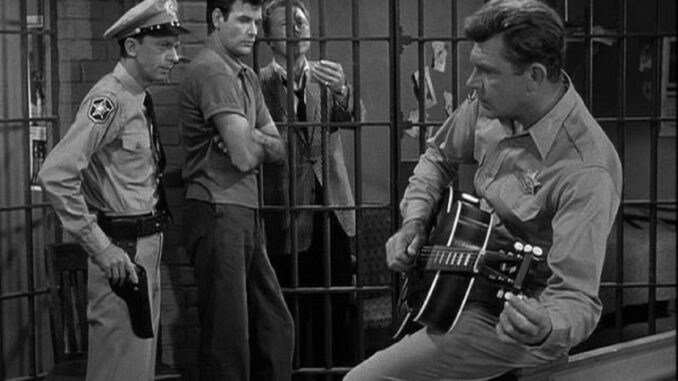
In the quiet, sun-dappled heart of Mayberry, where the rhythm of life beat with the slow, sure tick of a grandfather clock and the only major discord was usually a squabble over a lost fishing lure, an unusual melody began to play. It started subtly, a whisper on the breeze, then swelled into a full orchestral promise, played not on instruments but on the eager hearts of the town’s good folk. This was the prelude to the arrival of Professor Eldridge Abernathy, Mayberry’s very own Music Man, and the eventual, inevitable, clinking coda of Andy Taylor’s justice.
Professor Abernathy, a man whose smile could charm a bird out of a tree and whose words flowed like a finely aged honey, blew into town on a gust of unseasonable ambition. He wasn’t peddling a river city boy's dreams of a seventy-six trombones parade, but a more subtle, Mayberry-appropriate fantasy: a “Civic Harmony Ensemble.” He spoke of brass choirs that would echo through the valley, of woodwinds weaving sonic tapestries, of percussion that would beat with the very pulse of Mayberry's proud spirit. He wasn't selling instruments; he was selling identity, a grander version of themselves. He promised that a town with a symphony, even a fledgling one, was a town of culture, of progress, of undeniable distinction.
Mayberry, bless its trusting soul, was captivated. Aunt Bee envisioned herself at the inaugural concert, perhaps in a new hat. Goober began to practice imaginary drum solos on the counter of the filling station. Even Barney, usually suspicious of anything new that wasn't a regulation firearm, was caught in the Professor’s effervescent net, imagining himself leading a clarinet section, perhaps with a specially tailored uniform. Funds were collected with surprising speed, dreams were spun as delicate as spider silk, and the promise of Mayberry’s musical renaissance hung in the air, sweet and intoxicating.
But Sheriff Andy Taylor, with his quiet wisdom and eyes that saw beyond the surface shine, felt a familiar hum of unease. He wasn't cynical, not precisely, but he possessed an innate radar for dissonance in the Mayberry harmony. While others saw a visionary, Andy saw a man whose eyes, even as they twinkled with grand pronouncements, never quite settled. He heard the soaring rhetoric but noted the lack of practical details. The Professor was quick to collect the money for instruments, for uniforms, for "special instructional materials," but oddly slow to produce anything tangible beyond a few glossy pamphlets and a dazzling, if vague, schedule of future rehearsals.
Andy watched, he listened, and he waited. He noted that Professor Abernathy always seemed to avoid direct questions about the instrument order, always had a pressing engagement when someone suggested visiting the supposed "music factory." The melodies he hummed were always grand, but the actual notes remained unplayed. The town’s money, collected with such innocent enthusiasm, was being funneled not into instruments, but into the Professor’s rather lavish lodging expenses and his ever-present cigar habit. The "Civic Harmony Ensemble" was, in fact, an elaborate air guitar solo, played with Mayberry's hard-earned dimes.
The moment came, as it always does in Mayberry when deceit tries to masquerade as truth. It wasn't a dramatic, high-noon confrontation, but a quiet unraveling. Andy, with a few well-placed phone calls and his characteristic patient sleuthing, uncovered the Professor's trail of similar "Civic Harmony" schemes across several other unsuspecting small towns. There were no instruments ordered, no instructors hired, just empty promises and lighter community coffers.
The day Andy put the handcuffs on Mayberry’s Music Man was less a clash of titans and more a gentle but firm reassertion of order. Professor Abernathy, stripped of his mellifluous voice and grand gestures, looked surprisingly small and ordinary. The clink of the cold steel, a sharp counterpoint to the phantom symphonies he had promised, resonated with a quiet finality in the sheriff's office. There was no parade, no fanfare, just the stark truth.
Mayberry, initially stunned, then disappointed, eventually let out a collective sigh. The dream of their grand ensemble dissolved, but the genuine, unpretentious harmony of their community remained. Andy hadn't just apprehended a con man; he had protected the true music of Mayberry – the steady hum of good neighborliness, the genuine laughter of friends, the honest labor that built their lives. The Music Man had tried to sell them a superficial melody, but Andy had reminded them that Mayberry’s true symphony was always found in the quiet, authentic rhythms of its heart, requiring no grand maestro, only good, honest souls. And that was a tune worth keeping.